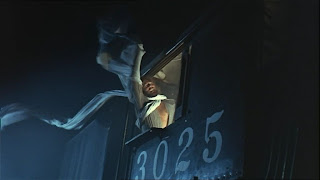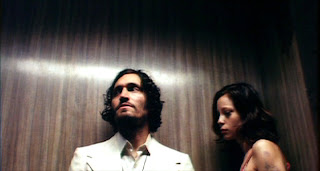
Years of playing in a rugby club have left me pretty thick skinned. After a decade of changing room banter, I'm pretty much unflappable when it comes to being offended. Which leaves me in a difficult position when reviewing David Wain's
The Ten, because it didn't really offend me, even though I can't help feeling it probably should have. Unless you're similarly unoffendable, I have to advise you steer clear of this. Certainly it goes too far for the majority of Christians, and I'm amazed that it's escaped the ire of some of the volatile sections of the Christian press.
None of which will overly concern Wain and his ensemble cast. Their aim is clearly for envelope-pushing, taboo-breaking, bawdy comedy, and, it has to be said, they are rather good at it. Perhaps it's because the film's surrealism makes everything so absurd, or because beneath the silliness of it all its satire is occasionally wickedly effective. Some people might think that I should probably give this film a bad review just on principle, yet that would be neither honest nor fair and it certainly wouldn't be accurate.
The Ten is effectively a shortened version of Kieslowski's
Dekalog for fans of American, gross-out humour. Like Kieslowski's film, the ten short films which comprise
The Ten sometimes map to more than one commandment, and do not always support their conclusion. The characters from the various stories crop up in smaller roles in other segments, whilst Paul Rudd's host character acts as a kind of "watcher" providing a continuous presence throughout the film.

In contrast to Kieslowski's film, however, the film is more about entertainment than serious moral exploration. That's not to say moral exploration is entirely absent. Indeed the opening skit's take on the fickleness of celebrity culture is spot on, and will, no doubt, ring true for one or two members of the cast. Stephen Montgomery is forced to spend the rest of his days living in the ground after a tragic sky diving accident, but unexpectedly becomes a star, grabbing headlines, interviews, a cult fan base and even his own sitcom. Eventually, though he becomes self obsessed, falls foul of the law and is caught in media scandal. It's far from co-incidental that his girlfriend is played by Winona Ryder, whose character also features in the "Thou shalt not steal" episode.
It's perhaps the second section which has the most potential to offend. A woman (Gloria) travels to Mexico and gains a sexual awakening at the hands of a local carpenter named Jesus. He appears to be normal until one day he suddenly dashes off across the water to grab her some flowers. Astonished, Gloria questions him and he eventually reveals that he is the real Jesus, but that he's not quite got around to bringing about Armaggeddon because it's such a lot of work.

Other sections tread slightly safer, though no less eccentric ground: two neighbours engage in a ridiculous attempt to outdo each other by buying a huge number of CAT scan machines, a woman runs off with a ventriloquist's dummy, and a surgeon is jailed after leaving a pair of scissors inside his victim "
as a goof". That said, other segments of the film do return to more risky territory such as the story which reunites us with surgeon in jail. There he is struggling to decide which of his two fellow inmates should get to be the one who rapes him. It's both utterly appalling and yet also brilliantly written.
What's impressive about
The Ten is the way in which it manages to alternate the style of the various segments without losing the flow of the film as a whole. One section is partially animated, another is partially subtitled, some are parody, others merely absurd. It even manages to develop the linking sections into its own narrative where Woody Allen films such as
Annie Hall are not only discussed, but also evoked.

But Wain reserves the best segment until last, with his take on keeping the Sabbath holy (something I suspect is deliberate as this commandment usually appears at number 4). In a plot resembling the
Simpsons episode where Homer skips going to church, Oliver feigns illness in order to grab himself a relaxed Sunday morning. Somehow he ends up spending the morning naked, and he finds the experience so surprisingly liberating that the following week he invites his friend, who later invites his own friends starting a movement which grows and grows. It's done so well that it well and truly skewers all those male bonding movies like
Fight Club and
The Full Monty, whilst simultaneously providing a suitably amusing finale.
In many ways
The Ten's surreal humour, and its controversial take on a religious subject, make it something of a successor to
Life of Brian. And like that film it is actually funny - although it takes a little while to get used to its unique brand of humour. Whilst it's hard to imagine that
The Ten will ever become as popular inside the church as
Life of Brian has, there is certainly some common ground.
Ultimately, then,
The Ten is the kind of film that I could recommend to almost no-one, but that, nevertheless, I have to admit I enjoyed. Which leaves me wondering whether my own conscience has given up the ghost, and permitted the rest of me to have a great time at the wake.
Labels: Comedy, Ten (The - 2007)
 Peter Chattaway has news of a forthcoming film based on the Jewish Midrash. Young Avraham will follows the childhood of Abraham upto the point that he burst onto the scene in Genesis 11. Peter thinks this is the first example of a film being released which is based primarily on a midrashic tale (as opposed to merely incorporating midrashic accounts to flesh out a biblical story).
Peter Chattaway has news of a forthcoming film based on the Jewish Midrash. Young Avraham will follows the childhood of Abraham upto the point that he burst onto the scene in Genesis 11. Peter thinks this is the first example of a film being released which is based primarily on a midrashic tale (as opposed to merely incorporating midrashic accounts to flesh out a biblical story).









































 Despite a score of 8.4 on the
Despite a score of 8.4 on the